#sholem aleichem
Text
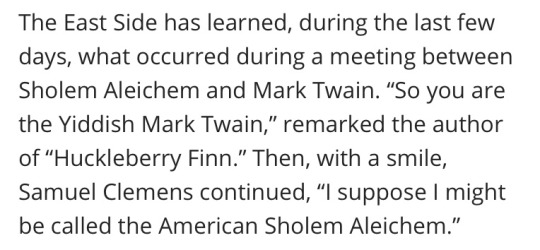
(Twain didn’t come up with that, a lot of reviews of Aleichem described him that way previously)
30 notes
·
View notes
Text

Natalia Zaratiegui's illustrated book cover for Sholem Aleichem's The Bewitched Tailor.
#natalia zaratiegui#book covers#sholem aleichem#russian literature#american literature#the bewitched tailor
16 notes
·
View notes
Text
“I don’t know if you believe my story. You’re the first one I’ve told it to… how & what & when! But now I think I’ve gone on too long.
"I would like to ask one thing of you. Don’t write about me in any of your books. And if you do? Don’t mention my name.”
-- Tevye’s parting words to author Sholem Aleichem, from Tevye the Dairyman
21 notes
·
View notes
Photo
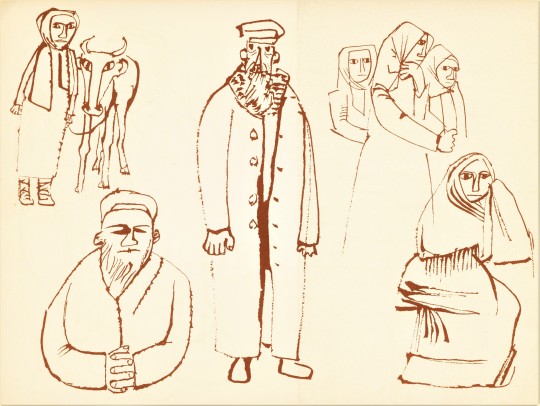

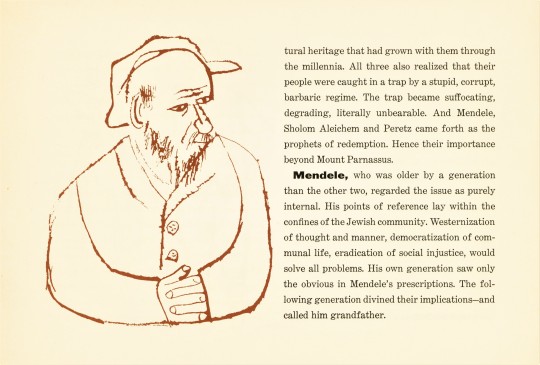

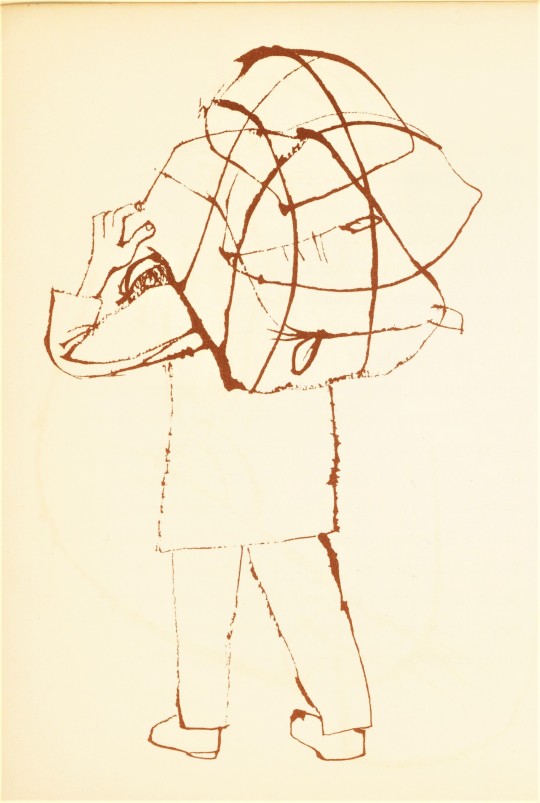

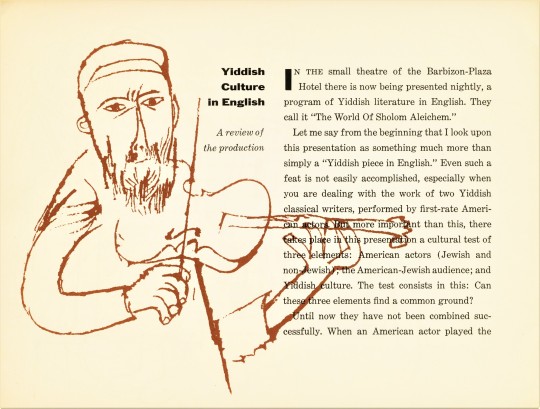
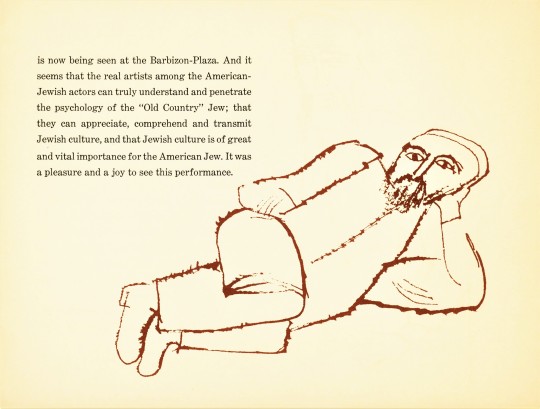

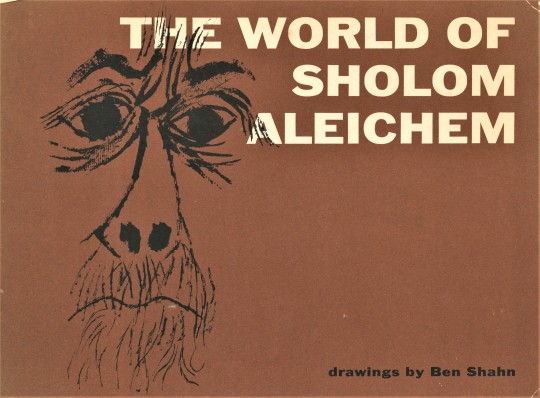
Happy Birthday Ben Shahn!
On this day, the twelfth of September, in 1898, the social realist artist Ben Shahn was born in Kaunas, Lithuania (then occupied by the Russian Empire) to Joshua Hessel Shahn and Gittel (Lieberman) Shahn. Here, in celebration of Shahn’s life, are pages from The World of Sholom Aleichem, published in 1953. Illustrated by Shahn, the brochure contains two articles by B.Z. Goldberg on his father-in-law, Solomon Rabinovich a.k.a. Sholem Aleichem. While publication information is scant, graphic designer and typographer Robert L Leslie is also listed as a copyright holder, and a tiny logo on the back cover credits the Amalgamated Lithographers of America with the printing. Also bound into the brochure is a playbill for the original 1953 off-Broadway production of Arnold Perl’s The World of Sholom Aleichem.
When Shahn was still a small boy, his father was accused of revolutionary activities and exiled to Siberia. In 1906, Gittel packed up Ben and his two younger siblings and moved the family to New York City, where they were reunited with Hessel after four long years. Shahn was apprenticed to a lithographer at the age of fourteen, during which time he developed a “complete infatuation with type.” But Shahn was also an avid learner and continued his studies in his free time, and considered a career as a scientist, studying biology at NYU for two years in his early twenties. He nevertheless settled on an art career, becoming a major figure in 20th-century American art.
Find more posts about the work of Ben Shahn here.
-Olivia, Special Collections Graduate Intern
#Milestone Monday#Birthdays#Ben Shahn#Social Realism#Sholem Aleichem#The World of Sholom Aleichem#B.Z. Goldberg#Robert L. Leslie#Amalgamated Lithographers of America#Arnold Perl#olivia
45 notes
·
View notes
Text
At the Source: Tevye der milkhiker by Sholem Aleichem
youtube
@jewishtransfantasy @professorlehnsherr-almashy @budcortfancam @princesssarisa @thealmightyemprex @makingboneboy @faintingheroine @the-blue-fairie
#musical hell#sholem aleichem#tevye der milkhiker#tevye the milkmam#tevye the dairyman#fiddler on the roof#Youtube
5 notes
·
View notes
Text
[Free Audiobooks] The Memory of Light by Francisco X. Stork & Tevye the Milkman by Sholem Aleichem [Award-Nominated YA Mental Health Drama & 19th C Classic Literature Musical Inspiration]
[Free Audiobooks] The Memory of Light by Francisco X. Stork & Tevye the Milkman by Sholem Aleichem [Award-Nominated YA Mental Health Drama & 19th C Classics Literature Musical Inspiration]
The annual SYNC Summer of Listening program continues, promoting literacy among teens by giving away YA-friendly weekly paired audiobooks—1 modern, 1 classic/drama performance—free for a limited time courtesy of the the participating publishers and sponsor AudioFile Magazine.
This 16th and final week's selections, available through Wednesday August 17th, have a theme of “People We Meet on the Way”, featuring stories centred upon the meaningful encounters characters have with strangers:
The Memory of Light by award-winning Mexican-American author Francisco X. Stork, read by Frankie Corzo from Scholastic Audiobooks. This is a YA contemporary drama/journey of self-discovery novel starring a teenaged girl who chooses to seek treatment in a Mental Disorders Ward in the wake of a failed suicide attempt, attempting to find reasons to continue living as she gets to know the other patients and staff at the hospital. This novel was a longlist Commended Title for the 2017 Américas Award promoting children's and YA books with a focus on Latino-related topics, as well as a Top 100 title for the American Library Association's annual lists of Best Fiction for Young Adults and Amazing Audioboks for Young Adults in this audio performance.
Tevye the Milkman by Sholem Aleichem, a 19th century Yiddish-language author from the area which is now Ukraine, read by Neville Jason, from Naxos Audiobooks. This is a themed collection of his vintage classic short stories from the late 19th century, which formed the basis of a later stage play that was adapted into the enduringly popular musical “Fiddler on the Roof”. These are the tales of the daily life of a pious Jewish dairyman in a small village in the Russian empire, and the trials and tribulations he endures as the patriarch of an large and unruly family in a time of religious prejudice and change due to outside influences.
The freebies are claimed via the Overdrive Sora app for iOS & Android or directly via the Sora website. You'll need to register just once with a valid email address and the signup code provided via the front page of the promotion and follow the instructions on the FAQ page to “Borrow” each week's featured selections for a permanent loan you can listen to anytime via online streaming on all devices or download for just the apps. NB: if you need to free up space on your device later, be sure to follow the FAQ instructions to ONLY delete the downloaded files and NOT “Return” which would remove your future access.
Offered free worldwide through Wednesday August 17th (until just before midnight Eastern Time), available directly from the Sora website and apps. I hope you've enjoyed another year of the SYNC Summer of Listening giveaway and listening to whichever titles you decided to get.
#free audiobook#francisco x. stork#sholem aleichem#fiddler on the roof#young adult#contemporary fiction#classics#mental health#yiddish literature#jewish#latinx
0 notes
Photo

#Thursday August 11#freeaudiobooks#SYNC#Sholem Aleichem#Tevye the Milkman#Francisco X Stork#The Memory of Light#teens#summer2022#SGCL
1 note
·
View note
Text
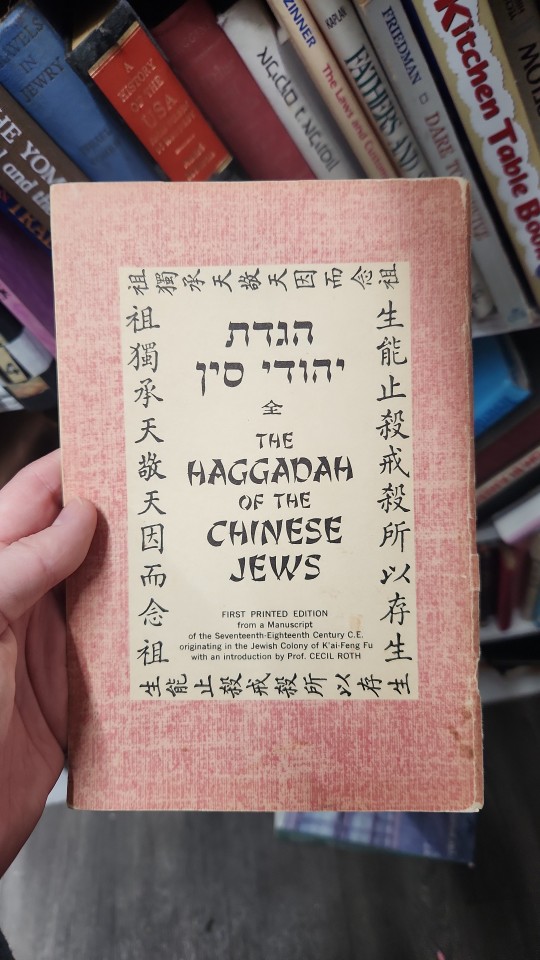
got this amazing find at a secondhand jewish bookstore yesterday for only $2!!
#excited to go through this on pesach#thrilled about my other books too#methinks I need to go to secondhand jewish bookstores more often#other finds included: a 1946 edition of a translated sholem aleichem compilation#a book of the letters of rabbi ovadiah of bartenura as he traveled to jerusalem#and an old book about the traditions of jewish village life in southern germany#eeeeeee im so excited to have all this new reading material for this shabbat#jewish history#books#judaism
208 notes
·
View notes
Text

The number of rabbis who literally ARE outspoken and agnostic women to begin with….
#Have they…. Have they MET a rebbetzin#But this sounds like Jewish fleabag and that is so so funny to me because you literally cannot do a one to one with fleabag#In the religion that’s like pleaaaaaase holy people pleaaaase enjoy sex and get married and have lots of babies but just have sex for fun#Pleaaaaaaade#pleaaaaaase#The kind of traditional in joke about rebbetzin sins - rabbis wives - in traditional Jewish communities#And I mean I’m talking about like. Sholem aleichem here -#Is that they’re loudmouth (affectionate) busybodies (affectionate) who run everything (affectionate)#Show me THAT representation
16 notes
·
View notes
Text
.
#today was a good day#The Tel aviv light rail finally opened on Friday#So I went to work from [boyfriends] place#and we spent a lot of the weekend just walking around bnei brak#and then he spontaneously picked me up from work today#and first we went wandering around into judaica shops and a gigantic used bookstore#where we bought a Yiddish language sholem Aleichem book#and then we went to get malabi and we sat at hamalabiyah and reading together in Yiddish#It was very unexpected and romantic and fun
2 notes
·
View notes
Text
Fiddler on the Roof's Motel and Tzeitel have huge he/him + she/they lesbian energy
#sholem aleichem was really ahead of his time when he wrote tevyes stories#ive talked about them as lesbians before but it wasnt quite right. now ive cracked it#im back into fiddler again because the local theater has auditions for it next week#but im planning to move before performances#and i couldnt handle being in an all goy fiddler anyway#ah... cest la vie
0 notes
Text
FRIENDS — PLEASE SHARE!
The Sholem Aleichem Cultural Center in the Bronx was recently the victim of antisemitic vandalism. They have started a GoFundMe to cover cleaning costs. They need our help! The center is a vital Yiddishist organization that has been serving New York for over 50 years, and they are in desperate need of financial assistance. Please reblog and share widely!!!! A gitn shabes.
499 notes
·
View notes
Text
(JTA) — As we mark the grim second anniversary of the Ukraine conflict this Shabbat, I’m reminded of a haunting melody I heard in the city of Poltava last month.
I was standing before Sonia Bunina, a plucky 17-year-old, when she opened her mouth to sing when an air raid siren rang out.
I flinched. Not Sonia — she didn’t miss a beat.
“Kol haolam kulo gesher t’zar meod, veha’ikar lo lifached k’lal,” she belted out before seeking shelter. “The whole world is a very narrow bridge, and the most important thing is to have no fear at all.”
Sonia, like so many Jews I know in Ukraine, is many things — determined, grieving, focused — but she’s certainly not cowering.
As she sang those words by Rebbe Nachman of Breslov — the Ukrainian Jewish sage whose followers continue to come by the tens of thousands to his grave in Uman annually — she embodied the prayer’s indomitable spirit.
Sonia and I met outside Poltava’s Hesed, part of the network of Jewish humanitarian hubs founded by my organization — the American Jewish Joint Distribution Committee, or JDC — more than three decades ago. Today they’re a lifeline to tens of thousands of Jews facing loss and strife. Since she was a toddler, Sonia has been attending activities at Hesed — her mother coordinates cultural programs for the elderly, and she connects teen volunteers like herself with isolated seniors, a critical source of comfort these last two years.
These days, traveling to Ukraine feels like a pilgrimage — there’s a pull in my soul to visit family near Lviv, to bear witness to Ukrainian Jewish resilience, and to be inspired by the clarity of purpose that is so palpable there. Since my first trip in 2011, I’ve been eight times. Last year, I wrote about how a year of crisis had transformed the ordinary into the sacred in Ukraine. Now, visiting feels even more essential with the worsening humanitarian situation.
Ukrainian Jews aren’t blasé about these challenges — far from it. Just take the delicate ballet of emotions on their faces when checking their phones during an air alert — contacting loved ones, scrolling through photos of devastation, and analyzing Telegram chats speculating on a given rocket’s make and trajectory.
But life goes on — there’s work to do — and though they’ve lost so much, they refuse to give any more away.
Showing up for each other, whatever it takes, is now baked into their very essence as Jews, and in Ukraine, there are tens of thousands to serve — hungry old women and displaced young families, disabled Holocaust survivors and stunned middle-aged professionals, shocked to now need help when they were once donors and volunteers.
They act fearlessly to ensure their communities make it through this crisis, body and soul intact. Can we expect anything less than boundless creativity from the people who birthed Sholem Aleichem and the Baal Shem Tov?
“These bombings, all these things that are killing people, destroying houses, leaving children homeless … it’s very scary,” Galina Limarenko, an 82-year-old retired nurse, told me in her small bedroom in Berezivka, taking note of the warm blanket, firewood, and other winter supplies my colleagues provided. “Thank God for the Jewish community, which never gives up and always shares even their very last piece of bread.”
I saw that irrepressible spirit again at our Beit Dan JCC in battered Kharkiv — a shapeshifting wellspring of strength just a few dozen kilometers from the eastern border. Shortly after Feb. 24, 2022, the center became a staging ground for truckloads of emergency aid — part of the 800 tons of humanitarian assistance we’ve delivered so far.
A few blocks from missile strikes, it now hosts children’s camps and soulful Shabbat services and operates a “kids hub,” offering academic enrichment to children who haven’t had in-person school for years — robbed of normal childhood by the pandemic and now the ongoing crisis.
And amidst blizzards and blackouts, Beit Dan has also become a “warm hub,” a safe place for beleaguered Jewish Kharkivites to charge their devices and obtain a hot drink and warm meal.
“If you share in our pain, and provide support where it’s needed, I’m forever grateful,” said Nika Simonova, Beit Dan’s program director. “The ability to remain human is the main thing. Done right, I believe that can save the world.”
That’s why we at JDC, aided by a coalition of partners including the Jewish Federations, Claims Conference, and International Fellowship of Christians and Jews, deployed a historic response to this conflict and remain committed to the Jewish future here.
We’re focused on ongoing humanitarian support for more than 41,000 Ukrainian Jews, expanding trauma relief, closing children’s educational gaps, and getting unemployed Jewish community members, among millions of Ukrainians plunged into poverty, back to work.
There is no doubt that the Jewish world is now responding to crises on multiple fronts, including this one, but we have been here so many times before. We must draw strength from our history and from the sure knowledge that this is what we’re built for. Our compassion and commitment, when leveraged with that timeless sense of mutual Jewish responsibility, means we can tackle the challenges we face — and come out on the other side even stronger.
As I walked through Lviv on my last day in Ukraine, I asked my cousin Anna Saprun, a 25-year-old business analyst, how this period has changed her.
“I hate what’s brought me here, but I love who I’ve become,” she said with a fierce and feisty smile. “Nothing scares me anymore. I feel powerful.”
Two years after the conflict began, Ukraine’s Jews are inspired anew each day, resolute in the sure knowledge that they know exactly who they’re working for — each other.
120 notes
·
View notes
Text
For some reason this one really wrecked me, more than most. What a complete disregard for culture and peace.
Yiddish is a language of diaspora Jews desperately clinging to a shred of their heritage while being oppressed in Western Europe. It is the language of European Jews forced to live in shtetls. It is a language that predates modern Israel and the resurrection of Hebrew. It is the language of the diaspora in which antisemites and anti-zionists so desperately want Jews to remain. It is a language of the oppressed. It is a language of loss. It is a language of exclusion. It is a language of community. Of Jews finding each other and building community in the face of oppression.
Sholem Aleichem was a Yiddish author and playwright. His works inspired Fiddler on the Roof, a musical about literal Jewish expulsion from Russia after continued violent assault.
Additionally, the related Hebrew greeting (Shalom aleichem) means, “peace be upon you”)
Also, it nearly exact to the traditional Arabic greeting “As-salamu alaykum” which means the exact same thing. And is used by Muslims as well as Arab Jews who were expelled by Muslim countries between 1948 and 1972.
Finally, shalom aleichem is a Jewish liturgical song—one of my favorites—and it explicitly calls on G-d and angels to bring peace.
It’s used to ring in Shabbat
I cannot put into words how deeply offensive this is to me personally. I am so wounded by this.

youtube
68 notes
·
View notes
Note
Genuine question: I know that Jewish people don’t say ‘rest in peace’, rather, ‘may their memory be a blessing’, but I watched the film Yentl recently, and they only ever said ‘rest in peace’, which I found a little odd, as it contradicted what I knew of Judaism. Do you know if this would have been cultural difference, a mistake or purposeful change on the part of the writers, or any other reason? I’m not Jewish, but I’m interested in learning about different religious and cultural practices, and I’ve been trying to learn more about Judaism recently, so it was something that stood out to me.
It's a purposeful change to make the appealing to gentiles. There's a lot of elements they changed in the movie- Jews don't call the Tanakh the "Pentateuch" in regular conversation, for example. Even the names were changed to be easier- in Isaac Bashevis Singer's short story, Hadass's name is Hodes, which is a far more common Yiddish name than Hadass. And of course the original short story is much more sexually charged and gender challenging, but Barbara Streisand specifically sanitized the film to appeal to secular audiences (in the same way Fiddler on the Roof sanitizes the original Sholem Aleichem stories). Listen I love Babs but she literally holds the copyright over the short story in English now even though she didn't write it so now in order to make an adaptation that isn't as whitewashed as the Yentl film, artists have to use only the original Yiddish story.......I love the movie but it's also deeply sanitized and whitewashed deliberately, because the only way Jewish stories can be told is if they're "cleaned up" for gentiles' consumption.
227 notes
·
View notes
Photo
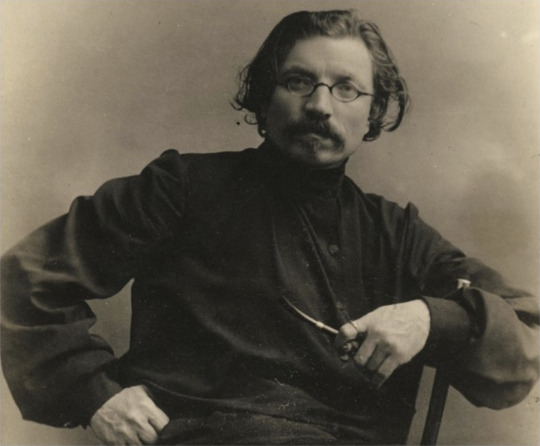
Sholem Aleichem Uncredited and Undated Photograph
“Life is a dream for the wise, a game for the fool, a comedy for the rich, a tragedy for the poor.“ Sholem Aleichem
105 notes
·
View notes